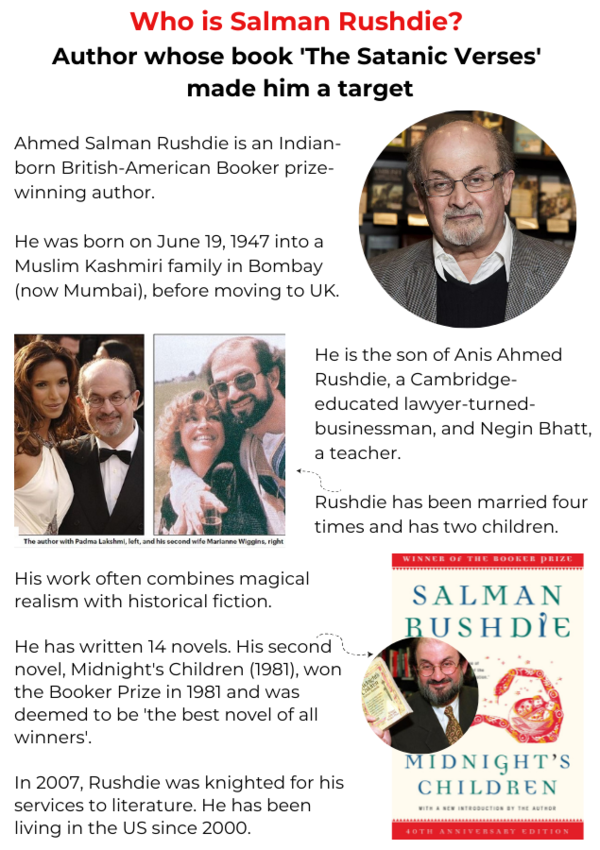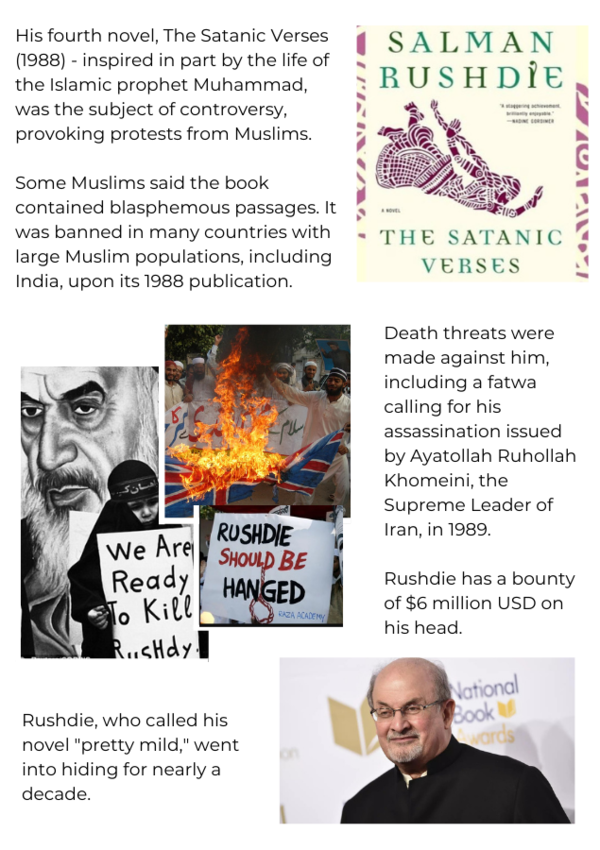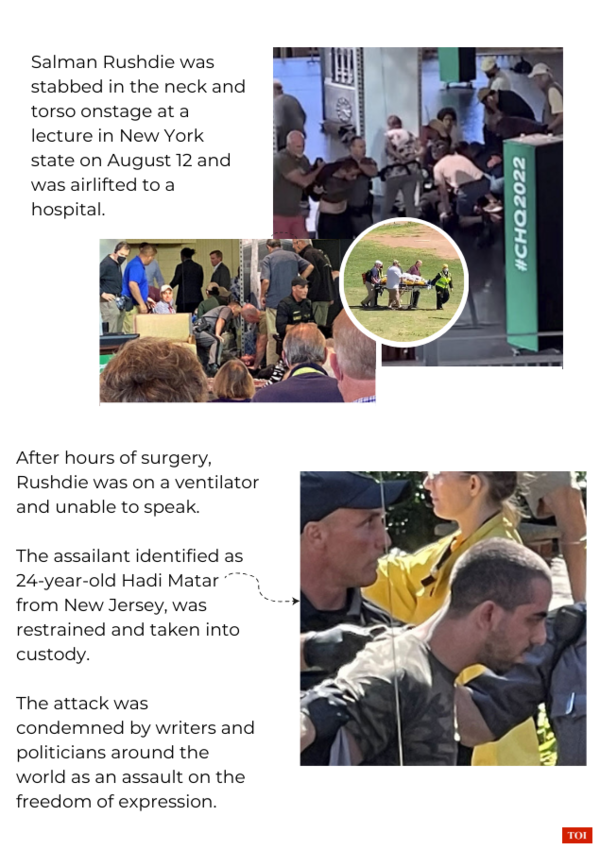
[ad_1]
The British author of “The Satanic Verses”, which sparked fury among some Muslims, had to be airlifted to hospital for emergency surgery following the attack.
Salman Rushdie attacked: Live updates
The attacker, who stabbed the author at least “10-15 times” according to witnesses, has been identified as Hadi Matar, a 24-year-old man from Fairfield, New Jersey who is said to have pro-Iran views.
Here’s a round-up of the latest developments …
‘The news is not good’
The Mumbai-born author was put on a ventilator with a damaged liver and may lose one of his eyes after sustaining injuries in the neck and abdomen.
Giving an update about Salman Rushdie’s condition, his agent said in a statement obtained by The New York Times that “the news is not good.”
“Salman will likely lose one eye; the nerves in his arm were severed; and his liver was stabbed and damaged,” said agent Andrew Wylie, who added that Rushdie was unable to speak.
Carl LeVan, an American University politics professor attending the literary event, told AFP that the assailant had rushed onto the stage where Rushdie was seated and “stabbed him repeatedly and viciously.”
Rushdie attacker sympathetic to ‘Shia extremism’
Hadi Matar, the man detained in connection with the stabbing, was sympathetic to “Shia extremism” and the causes of Iran’s Islamic Revolutionary Guard Corps, according to a media report.
Matar ran up onto the stage prior to a speaking event at the Chautauqua Institution in Chautauqua and attacked 75-year-old Rushdie.
Authorities were still looking into Matar’s nationality and his criminal records, if any. They believe he was alone but are investigating “to make sure that was the case.”
A preliminary review of Matar’s social media accounts by law enforcement showed him to be sympathetic to Shia extremism and the causes of the Islamic Revolutionary Guard Corps (IRGC), a law enforcement person with direct knowledge of the investigation told NBC News.
Though there are no direct links between Matar and the IRGC, law enforcement officers reportedly found images of slain commander Qassem Solemani and an Iraqi extremist sympathetic to the Iranian regime in a cell phone messaging app belonging to Matar, according to NBC News.
‘No security at the event’
According to various accounts by witnesses, Rushdie was attacked as he was being introduced at about 10:45am.
A witness said he heard shouting from the audience. He said a man in a black shirt appeared to be “punching” the author. The witness, who was 75 feet from the stage, did not hear the attacker say anything or see a weapon.
Some people in the audience ran to render aid while others went after the attacker, the witness said. State police said a doctor who was in the audience during the event rendered aid to Rushdie until emergency responders arrived.
New York Gov Kathy Hochul told reporters Friday a state trooper “stood up and saved (Rushdie’s) life and protected him as well as the moderator who was attacked as well.”
One witness of the attack told CNN there were no security searches or metal detectors at the event.
The suspect in Friday’s attack had a “pass to access the grounds,” Dr Michael E Hill, president of the Chautauqua Institution, said in the news conference. Guests can purchase passes to attend programs, Hill said.
World leaders condemn attack
Global leaders voiced anger over the attack on Rushdie, with French President Emmanuel Macron saying the author “embodied freedom” and that “his battle is ours, a universal one.”
British leader Boris Johnson meanwhile said he was “appalled,” sending thoughts to Rushdie’s loved ones and praising the author for “exercising a right we should never cease to defend.”
US National Security Advisor Jake Sullivan called it a “reprehensible attack,” adding that “all of us in the Biden-Harris Administration are praying for his speedy recovery.”
Iran conservative media hail Rushdie attacker
Iranian ultra-conservative newspaper Kayhan on Saturday hailed the assailant who attacked Rushdie. Notably, the author was the target of a 1989 Iranian fatwa calling for his death.
“Bravo to this courageous and duty-conscious man who attacked the apostate and depraved Salman Rushdie in New York,” wrote the paper, whose chief is appointed by current supreme leader Ayatollah Ali Khamenei.
“Let us kiss the hands of the one who tore the neck of the enemy of God with a knife,” the daily added.
With the exception of reformist publications including Etemad, the majority of Iranian media followed a similar line, describing Rushdie as an “apostate”.
No stranger to death threats
Rushdie, 75, was propelled into the spotlight with his second novel “Midnight’s Children” in 1981, which won international praise and Britain’s prestigious Booker Prize for its portrayal of post-independence India.
But his 1988 book “The Satanic Verses” transformed his life when Khomeini issued a religious decree ordering his killing.
The Satanic Verses has been banned in Iran since 1988, as many Muslims consider it offensive to Islam.
The author spent about 10 years under police protection in the United Kingdom, living in hiding after Iran’s late leader Ayatollah Ruhollah Khomeini issued a fatwa calling for Rushdie’s execution.
A bounty of over $3 million has been offered for anyone who kills Rushdie, who has been a prominent spokesman for free expression and liberal causes.
Since 2000, Rushdie has lived in the United States.
Threats and boycotts continue against literary events that Rushdie attends, and his knighthood by Queen Elizabeth II in 2007 sparked protests in Iran and Pakistan, where a government minister said the honor justified suicide bombings.
The fatwa and other threats failed to stifle Rushdie’s writing and inspired his memoir “Joseph Anton,” named after his alias while in hiding and written in the third person.



(With inputs from agencies)
[ad_2]
Source link